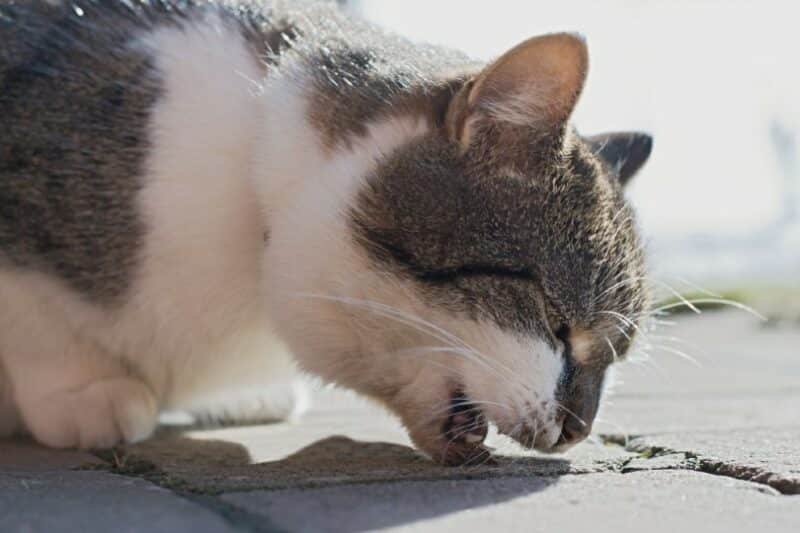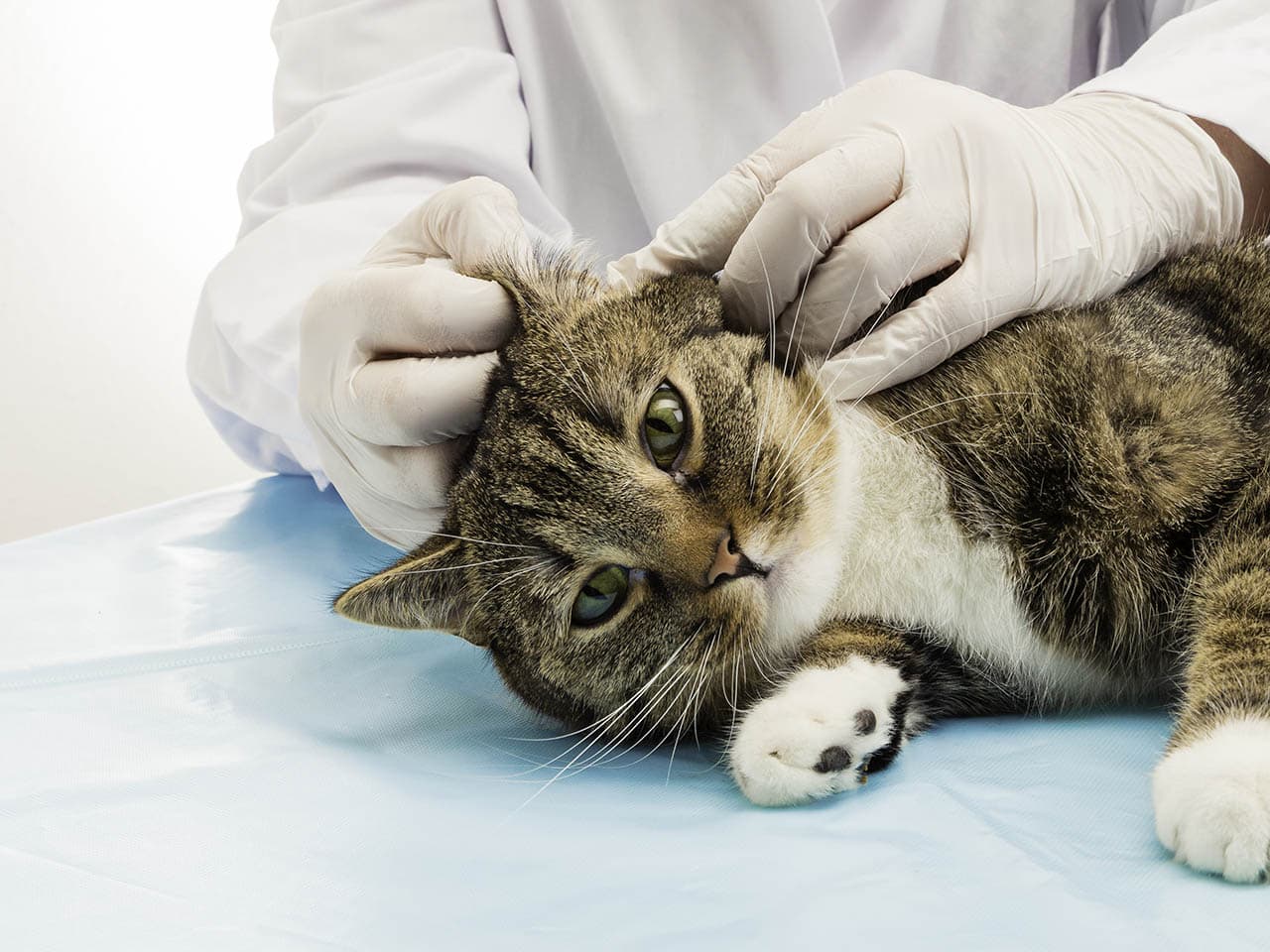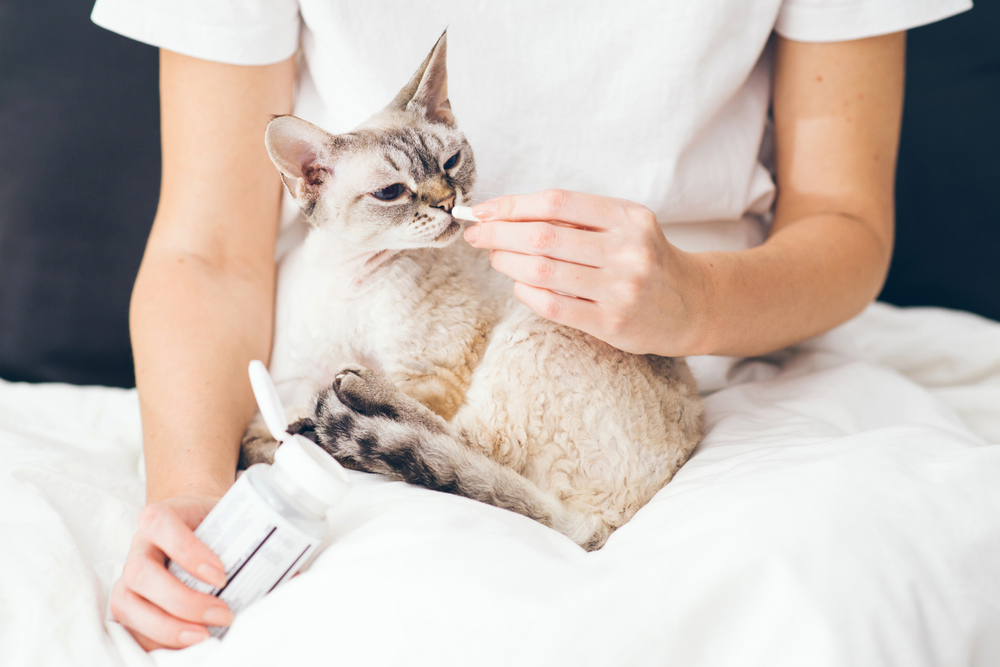As we know, cats love to play. They especially love stringy, wobbly things that flip-flop in a similar way to live prey. So, it’s no surprise that cats love rubber bands! Sadly, rubber bands are not an appropriate toy for cats and can cause serious complications if swallowed.
My Cat Likes Playing With Rubber Bands – Is That Safe?
It is not okay to let your cat play with rubber bands or similar items like hair bands. If swallowed, a rubber band can block your cat’s intestines, which requires surgery to correct and can be life threatening. Cats get just as much fun from toys designed for safe play.
If you choose a toy with dangly bits attached (like a cat wand), always supervise your cat during play to ensure no parts break off. Be sure to keep your supply of rubber bands hidden and out of your cat’s reach.
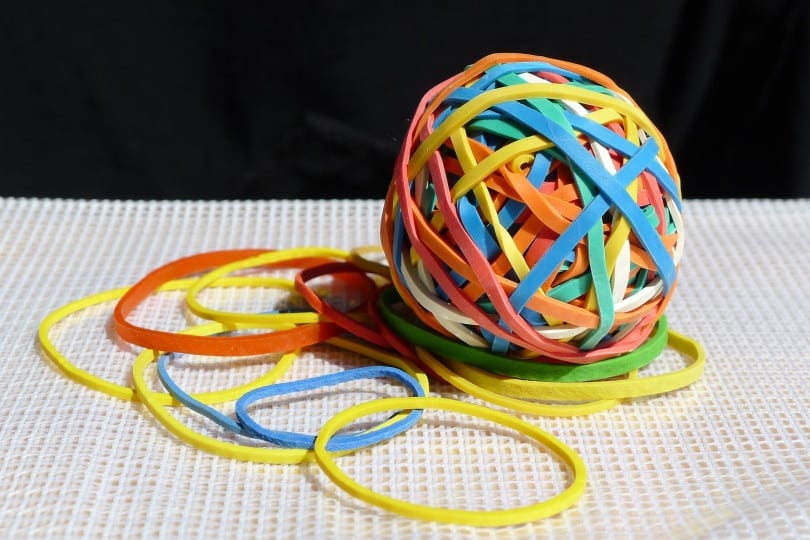

My Cat Ate a Rubber Band – What Should I Do?
Don’t panic! If your cat has swallowed a rubber band, it can cause serious problems, but not always. A small rubber band, or a piece of one, may pass through your cat’s digestive system without you even knowing.
Monitor Your Cat’s Poop
Your cat can’t break down rubber in their gut, but they may pass rubber with their poop. That is the best outcome. If you know exactly what your cat has swallowed, you can monitor the poop for signs of the band. If you see it, you know there’s no concern.
A rubber band is not poisonous, but it’s the damage it can do from getting stuck that is a potential worry. The time it takes for a band to appear in the poop will vary from cat to cat, and objects not broken down during digestion can stay in the gut for a long time.
Will My Cat Be Okay After Swallowing a Rubber Band?
If the band is small (<1 inch) and the cat isn’t showing signs of ill health, then it’s okay to continue life as usual. If your cat becomes unwell, even if sometime later, make sure you tell your veterinarian that a rubber band was swallowed.
Swallowing a large rubber band (>1.5 inches) is more likely to make your cat sick. You should speak with your veterinarian, even if your cat seems fine. The larger or longer the piece of rubber, the more likely it is to cause serious complications.
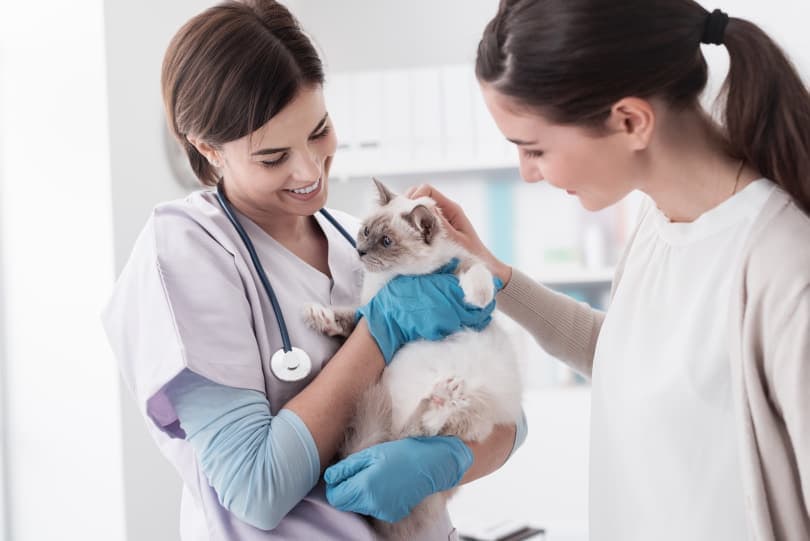
What Are the Signs That My Cat Is Not Okay After Swallowing a Rubber Band?
Cats that have swallowed a rubber band and are suffering from potentially dangerous consequences are likely to show at least one of the following signs:
- Not wanting to eat
- Vomiting
- Changes in their feces
- They may not pass any poo or may have diarrhea
- Being quieter than normal
- Sleeping a lot, not wanting to play
- Having a sore tummy
- They may not want to be picked up if your hand is under their belly
- Changes to their drinking
- They may drink a lot and vomit it back up, or may not drink much at all
If you know your cat has swallowed a rubber band and is showing any of these signs, you must immediately call your veterinarian. If you don’t know if your cat has swallowed something but they are showing one or more of these signs, it is still sensible to book an appointment with your veterinarian as soon as possible.
There are several reasons that your cat may have a tummy upset, be quiet, or be off their food, but it is important to get them checked over.
Why Is Swallowing a Rubber Band Dangerous for My Cat?
Swallowing a rubber band can cause the following complications for your cat:
- Choking
- Tangling around the tongue
- Damage to delicate tissues inside the mouth or food pipe
- Blockage to the food pipe, stomach, or intestines
- Tangling of the intestines, or a condition called intussusception, where the intestine folds in on itself
These complications can be serious and life threatening. When the intestines are blocked, food and water cannot get through. Your cat might stop eating or vomit food they have recently eaten.
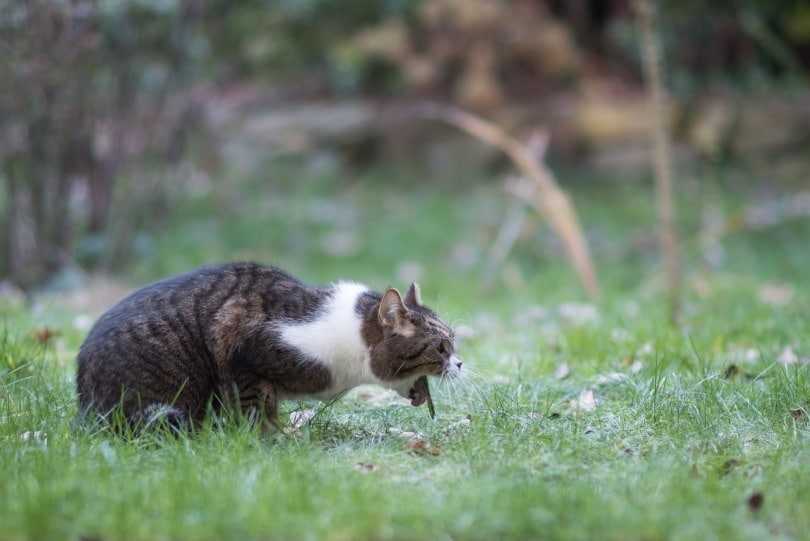

How Long Can a Cat Live With a Blockage?
If a blockage completely stops the passage of food through the gut, your cat will only survive a matter of days without appropriate treatment. Complications like tangling of the intestines can make them very ill quickly. The longer the blockage is unresolved, the worse the chance of a full recovery.
If your cat is unwell after eating a rubber band, it is urgent—call your veterinarian straight away.
My Cat Is Unwell After Swallowing a Rubber Band – What Will the Vet Do?
First, your veterinarian will speak to you about what has happened. Be prepared to tell them how long your cat has been unwell, what signs you have seen, and what has been swallowed. Try to be precise about when it was swallowed and how big it was.
Your vet will then examine your cat thoroughly and check for signs that might help confirm if there is a blockage. They will also check your cat’s general health by taking their heart rate and temperature. All this is important because if your cat has got something stuck, they could be starting to show signs of further complications, like dehydration. The treatment for a foreign object blocking or tangling the intestines is surgery, and your vet must know how safe it is for your cat to have an anesthetic.
X-Rays and Other Tests to Confirm a Blockage
Your cat may need X-rays, scans, and blood tests to help your veterinarian decide about their treatment. X-rays and scans can help confirm a blockage and pinpoint where in the gut it is. Blood tests can determine whether your cat is in good shape for the anesthetic and whether they need a drip to give them certain nutrients.
Everything your veterinarian does will help them confirm what is going on and make choices about treatment to give your cat the best chance of a full recovery. If you have any questions about your cat’s care, it’s okay to ask.
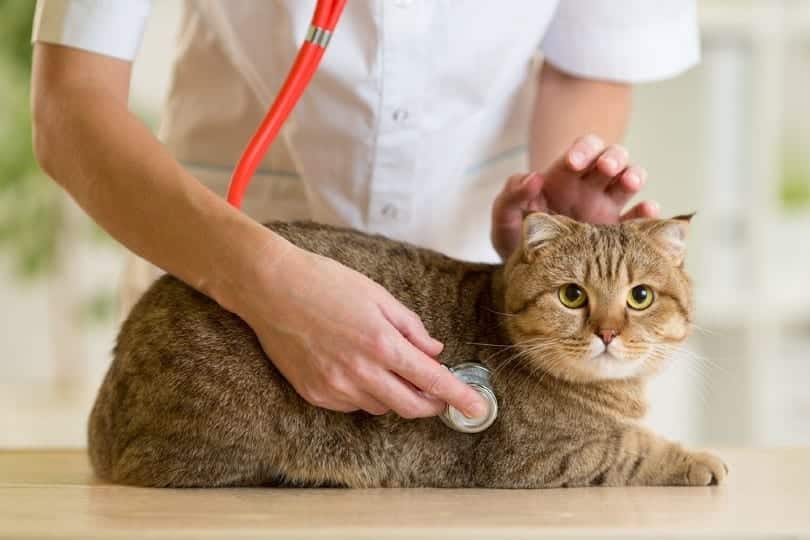

Can My Cat Die From Eating a Rubber Band?
In the most severe cases, swallowing a rubber band can be life-threatening. Rubber can block the intestines, meaning your cat needs urgent surgery. The signs of being ill from swallowing a rubber band are similar to many other illnesses.
It’s not always easy to know exactly why your cat is showing signs such as vomiting, being quiet, or ignoring their food, but your veterinarian is capable of making this assessment. If you know your cat has swallowed a rubber band and is unwell, call the vet urgently and mention what has been swallowed to them on the phone.

I Can See a Rubber Band in My Cat’s Mouth – What Should I Do?
If you can see a rubber band in your cat’s mouth—unless it comes away easily—please don’t try to remove it, and never pull on it. The band could be caught around the base of the tongue, be partially swallowed, or be caught on teeth. If you pull the band, you might cause harm to your cat. Don’t feed your cat or allow them to drink. Contact your veterinarian.
Your vet will be able to examine your cat’s mouth and, hopefully, remove the rubber band safely. They may need to sedate or anesthetize your cat to do so.
My Cat Is Pooing a Rubber Band, But It’s Stuck in Their Bottom – What Should I Do?
If your cat is trying to pass a rubber band, be gentle if you are trying to help. If you apply gentle tension and it comes away easily, that’s okay. But, if there is any resistance, never tug. You could do serious damage to your cat’s insides. If it’s stuck, call your veterinarian for help.
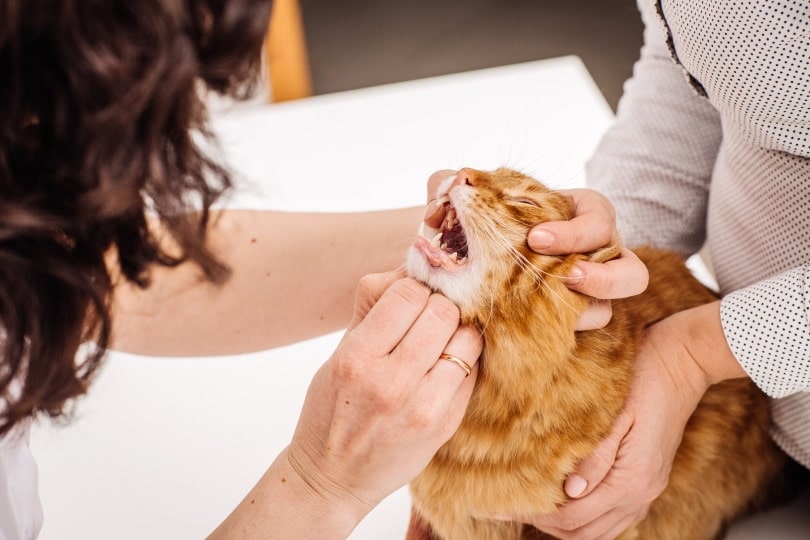

How Can I Stop My Cat From Swallowing a Rubber Band?
The easiest way to stop your cat from playing with rubber bands is to ensure they are not lying around your home. If your cat likes playing with rubber bands, try sourcing toys that provide the same stimulation but are safer, like cat wand toys.
However, all stringy toys should only be used under supervision. You can dedicate time every day to play with your cat, and playing together can strengthen your bond and provide exercise.
Find Other Ways for Them to Play
If your cat is bad about swallowing things and you dare not risk stringy toys, there are still many ways to enrich your cat’s world. Cats can enjoy puzzle feeders, wheels to run in, tunnels to run through, toys they can bat about, catnip, and climbing toys.
You can make cheap toys from home materials that are safer than rubber. For example, cardboard toilet roll tubes can hide food for puzzle games, and you can play fetch with a balled-up piece of paper. If you’re unsure whether homemade toys are safe, always ask your veterinarian first.
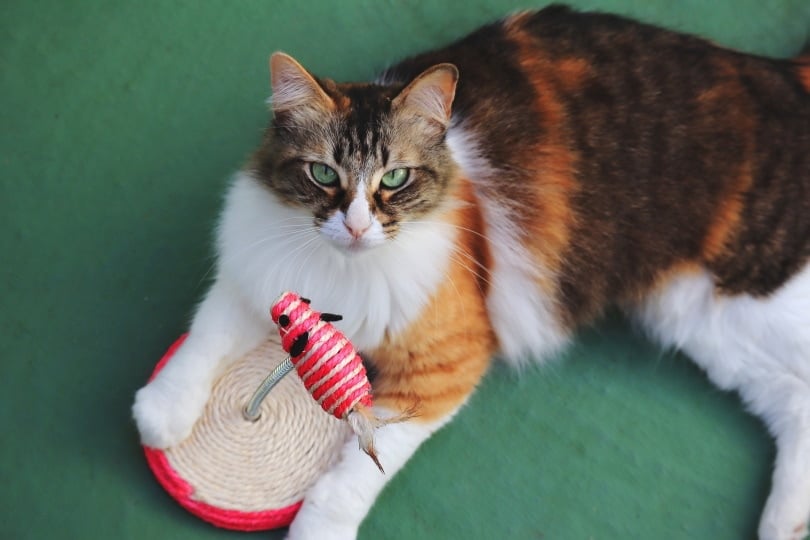
Final Thoughts
Cats love to play, and it’s vital to provide your cat with safe ways to do it. Playing with rubber bands is not safe, so don’t do it. If you see your cat with a rubber band, take it away and replace it with a safe toy.
If a rubber band is stuck in your cat’s mouth or bottom, don’t pull on it—see your veterinarian for help. If your cat has swallowed a large piece of rubber (>1.5 inches), call your veterinarian for advice, even if they seem fine. If your cat has swallowed a small piece of rubber (<1 inch), they may be okay, and it may pass unnoticed—count yourself lucky!
If your cat is not eating, vomiting, quiet, or showing signs of tummy pain, you should see your veterinarian promptly, whether you think they have swallowed a rubber band or not. If you know your cat has swallowed a rubber band or part of one and they start to show signs of ill health, call your veterinarian immediately.
See also:
- Is Aluminum Plant Toxic to Cats? Vet-Approved Safety Tips
- Can Cats Get Lyme Disease? Vet-Approved Facts & FAQ
Featured Image Credit: Tunatura, Shutterstock
Contents
- My Cat Likes Playing With Rubber Bands – Is That Safe?
- My Cat Ate a Rubber Band – What Should I Do?
- Will My Cat Be Okay After Swallowing a Rubber Band?
- What Are the Signs That My Cat Is Not Okay After Swallowing a Rubber Band?
- Why Is Swallowing a Rubber Band Dangerous for My Cat?
- How Long Can a Cat Live With a Blockage?
- My Cat Is Unwell After Swallowing a Rubber Band – What Will the Vet Do?
- Can My Cat Die From Eating a Rubber Band?
- I Can See a Rubber Band in My Cat’s Mouth – What Should I Do?
- My Cat Is Pooing a Rubber Band, But It’s Stuck in Their Bottom – What Should I Do?
- How Can I Stop My Cat From Swallowing a Rubber Band?
- Final Thoughts

